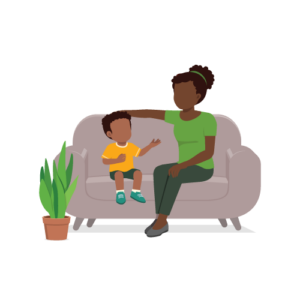 As your child grows, they will begin to become more confident in communicating, able to be understood by – and to understand – others. It’s always important that your child is able to make sense of what’s being said, share their feelings and make their needs known.
As your child grows, they will begin to become more confident in communicating, able to be understood by – and to understand – others. It’s always important that your child is able to make sense of what’s being said, share their feelings and make their needs known.
Your child has been working on their communication skills from birth. They would have recognised you and turned to your voice from birth. They would have then starting to cry and babble, progressing onto learning words and having fully fledged conversations.
The way you communicate with your child helps shape their emotional development, and teaches them how to build stronger relationships later in life.
Verbal and non-verbal
Communication is more than just the words we say and has verbal and nonverbal elements.
Verbal communication is communicating with words and includes:
- the words we say
- the sounds we make
- the pitch and tone of our voice
- the understanding of the words that are being said.
Nonverbal communication includes:
- facial expressions
- eye contact
- personal space
- hand gesturing and pointing
- physical touch, like a hug or taking someone’s hand.
How can you help?
How you play, talk and gesture to your child can make a big difference. Talk to your child about their thoughts, feelings, interests and experiences. Spend time together as a family. Engaging in activities in and out of school will help your child develop their communication skills.
- Make time every day to listen to your child without distractions, switching off the radio or TV and putting away your phone.
- Play and talk face-to-face at your child’s level.
- Ask open-ended questions, which is especially helpful if your child tends to give ‘yes’ and ‘no’ answers. For example, ‘what was the best thing about school today?’
- Allow your child to have differences of opinion respecting their point of view.
- Try not to interrupt or criticise them.
Families who might need further support
Some children and young people need further support to help them learn how to communicate effectively. The National Autistic Society provides advice and guidance on the challenges autistic people and their families face. Kent School Health offers one-to-one support based on your child’s unique needs. Visit our special educational needs page for more information on the support available for you and your child.
Useful resources
- If your child is having difficulties developing their speech sounds, language and communication, or difficulty with a stammer, feeding and swallowing, they may need extra support. If you think they need a referral to see a speech and language therapist, see your doctor or self-refer via the Children’s Therapies Pod. This Pod also has lots of useful resources to empower you as parents or carers, so you can support your child at home and at school.
- BBC’s Tiny Happy People has lots of tips for parents on supporting your child’s development.
- You can also visit Speech and Language UK for information relating to speech, language and communication needs.